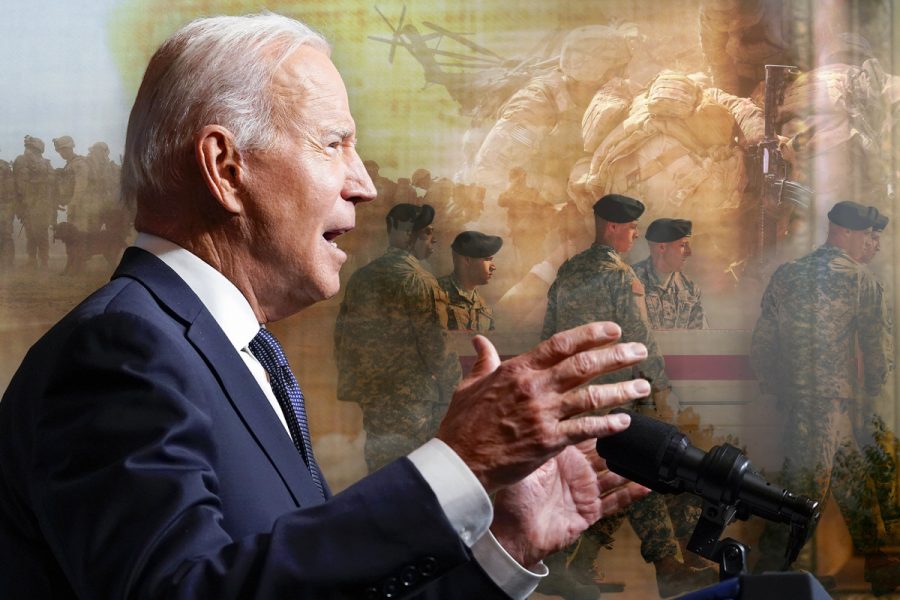Biden’s Troop Withdrawal May Withdraw National Respect
Some remember the harrowing day like it was just yesterday, as ashes from the World Trade Center rained down in New York City. The September 11, 2001 attacks marked a defining era in American history. Talks regarding national security amplified, resulting from the sordid slaughter witnessed that day. For 20 years, Americans have lived with the mentality that the attack will never be forgotten. This has remained true, as American troops have spent two decades fighting in Afghanistan. However, nearly 20 years later, the Biden administration announced that U.S. troops will be coming home by the anniversary of the attacks, ending the nation’s longest war.
On the surface, the move couldn’t seem any more appropriate. Twenty years of grueling warfare in the Middle East have resulted in the deaths of millions of U.S. troops as well as a more than $2 trillion price tag, a number that grows every passing day during a pandemic where economic recovery could not be more significant.
This constantly growing $2 trillion expense is now larger than Biden’s recently unveiled $2 trillion infrastructure plan to help rebuild the country in the wake of the pandemic. As a nation that saw our loved ones and our economy left in tatters due to the pandemic, war should be the very last thing America prioritizes.
It is clear that the issues affecting America today transcend the pandemic and even foreign warfare. Between distrust in American democracy, as shown in the Jan. 6 Capitol riot, the racial reckoning we witnessed last summer and now rising hate crimes against Asian-Americans, the country needs to focus on healing, and stop spending money on a war that has and will continue to leave many hurting. By allowing U.S. troops to remain in Afghanistan, America is sending mixed signals during a pivotal time in the nation’s history. The nation should not expect to rebuild itself with $2 trillion legislation yet simultaneously continue to pay even more money for the destruction of not just Afghanistan but the lives of those who valiantly fight to defend our nation.
Although this announcement is cause for rejoice, it is also cause for understandable repudiation. Prominent Republicans like Mitch McConnell believe the move is a grave mistake. Senator Lindsey Graham expressed concern that the withdrawal plan would provide a safe haven for terrorism to reemerge and possibly throw Afghanistan into another civil war, calling the move “a disaster in the making.”
Additionally, we are beginning to recognize that the Middle East is not our only foreign threat anymore. North Korea recently fired two short-range missiles, the first missile test since Biden took office. Moreover, the U.S. is just now responding to the massive Russian Solarwinds cyberattack, as well as meddling during the 2020 presidential election.
With so many contentious foreign relationships, now could not be a worse time to withdraw troops from Afghanistan. Although well-intentioned for the safety and security of our armed forces, this move projects weakness when the nation is already at its most vulnerable. The decision to withdraw troops has always been a controversial one simply because of the irreparable damage it could do to the American reputation. Ronald Reagan’s 1984 troop withdrawal from Lebanon represents this best, citing the military activity there as a nonsensical “military misadventure.” This was a national embarrassment on the heels of the Vietnam war.
With potential foreign threats looming in the forms of North Korea, Russia and with still-fragmented relations with the Middle East, America simply cannot afford either the national embarrassment or to be perceived as weak by other countries; Biden’s troops withdrawal plan may, unfortunately, project just that image. Such a move is also another inconsistency on the Biden administration’s behalf. After launching missile strikes in Iran and warning the country to tread lightly, it is not sensible to attempt to project the return of American military strength while simultaneously withdrawing troops in the process.
The return of our troops will be a glorious day for America, and equally so for our foreign adversaries who will perceive a nation of present vulnerability as one of fragility. As our troops come home from war, we must embrace them and remind them that they were never forgotten. However, we must also embrace the reality that our foreign adversaries by the likes of Afghanistan, Russia and North Korea are made fundamentally more threatening as a result of lack of military presence. We must never forget our heroes, but we also must never forget our enemies. As we approach the 20-year anniversary of the 9/11 attack, we must remember to never forget.
Noah Osborne, FCRH ’23, is a journalism major from Harlem, N.Y.








































































































































































































